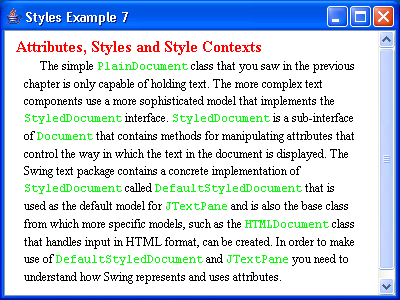JTextPane Styles Example 7

/*
Core SWING Advanced Programming
By Kim Topley
ISBN: 0 13 083292 8
Publisher: Prentice Hall
*/
import javax.swing.*;
import javax.swing.text.*;
import java.awt.*;
public class StylesExample7 {
public static void createDocumentStyles(StyleContext sc) {
Style defaultStyle = sc.getStyle(StyleContext.DEFAULT_STYLE);
// Create and add the main document style
Style mainStyle = sc.addStyle(mainStyleName, defaultStyle);
StyleConstants.setLeftIndent(mainStyle, 16);
StyleConstants.setRightIndent(mainStyle, 16);
StyleConstants.setFirstLineIndent(mainStyle, 16);
StyleConstants.setFontFamily(mainStyle, "serif");
StyleConstants.setFontSize(mainStyle, 12);
// Create and add the constant width style
Style cwStyle = sc.addStyle(charStyleName, null);
StyleConstants.setFontFamily(cwStyle, "monospaced");
StyleConstants.setForeground(cwStyle, Color.green);
// Create and add the heading style
Style heading2Style = sc.addStyle(heading2StyleName, null);
StyleConstants.setForeground(heading2Style, Color.red);
StyleConstants.setFontSize(heading2Style, 16);
StyleConstants.setFontFamily(heading2Style, "serif");
StyleConstants.setBold(heading2Style, true);
StyleConstants.setLeftIndent(heading2Style, 8);
StyleConstants.setFirstLineIndent(heading2Style, 0);
}
public static void addText(JTextPane pane, StyleContext sc, Style logicalStyle,
Paragraph[] content) {
// The outer loop adds paragraphs, while the
// inner loop adds character runs.
int paragraphs = content.length;
for (int i = 0; i < paragraphs; i++) {
Run[] runs = content[i].content;
for (int j = 0; j < runs.length; j++) {
pane.setCharacterAttributes(
runs[j].styleName == null ? SimpleAttributeSet.EMPTY :
sc.getStyle(runs[j].styleName), true);
pane.replaceSelection(runs[j].content);
}
// At the end of the paragraph, add the logical style and
// any overriding paragraph style and then terminate the
// paragraph with a newline.
pane.setParagraphAttributes(SimpleAttributeSet.EMPTY, true);
if (logicalStyle != null) {
pane.setLogicalStyle(logicalStyle);
}
if (content[i].styleName != null) {
pane.setParagraphAttributes(sc.getStyle(content[i].styleName), false);
}
pane.replaceSelection("\n");
}
}
public static void main(String[] args) {
try {
UIManager.setLookAndFeel("com.sun.java.swing.plaf.windows.WindowsLookAndFeel");
} catch (Exception evt) {}
JFrame f = new JFrame("Styles Example 7");
// Create the StyleContext, the document and the pane
final StyleContext sc = new StyleContext();
final DefaultStyledDocument doc = new DefaultStyledDocument(sc);
final JTextPane pane = new JTextPane(doc);
// Build the styles
createDocumentStyles(sc);
try {
// Add the text and apply the styles
SwingUtilities.invokeAndWait(new Runnable() {
public void run() {
// Add the text
addText(pane, sc, sc.getStyle(mainStyleName), content);
}
});
} catch (Exception e) {
System.out.println("Exception when constructing document: " + e);
System.exit(1);
}
f.getContentPane().add(new JScrollPane(pane));
f.setSize(400, 300);
f.setVisible(true);
}
// Style names
public static final String mainStyleName = "MainStyle";
public static final String heading2StyleName = "Heading2";
public static final String charStyleName = "ConstantWidth";
// Inner classes used to define paragraph structure
public static class Run {
public Run(String styleName, String content) {
this.styleName = styleName;
this.content = content;
}
public String styleName;
public String content;
}
public static class Paragraph {
public Paragraph(String styleName, Run[] content) {
this.styleName = styleName;
this.content = content;
}
public String styleName;
public Run[] content;
}
public static final Paragraph[] content = new Paragraph[] {
new Paragraph(heading2StyleName, new Run[] {
new Run(null, "Attributes, Styles and Style Contexts")
}),
new Paragraph(null, new Run[] {
new Run(null, "The simple "),
new Run(charStyleName, "PlainDocument"),
new Run(null, " class that you saw in the previous " +
"chapter is only capable of holding text. " +
"The more complex text components use a more " +
"sophisticated model that implements the "),
new Run(charStyleName, "StyledDocument"),
new Run(null, " interface. "),
new Run(charStyleName, "StyledDocument"),
new Run(null, " is a sub-interface of "),
new Run(charStyleName, "Document"),
new Run(null, " that contains methods for manipulating attributes " +
"that control the way in which the text in the " +
"document is displayed. The Swing text package " +
"contains a concrete implementation of "),
new Run(charStyleName, "StyledDocument"),
new Run(null, " called "),
new Run(charStyleName, "DefaultStyledDocument"),
new Run(null, " that is used as the default model for "),
new Run(charStyleName, "JTextPane"),
new Run(null, " and is also the base class from which " +
"more specific models, such as the "),
new Run(charStyleName, "HTMLDocument"),
new Run(null, " class that handles input in HTML format, can be " +
"created. In order to make use of "),
new Run(charStyleName, "DefaultStyledDocument"),
new Run(null, " and "),
new Run(charStyleName, "JTextPane"),
new Run(null, " you need to understand how Swing represents " +
"and uses attributes.")
})
};
}
Related examples in the same category